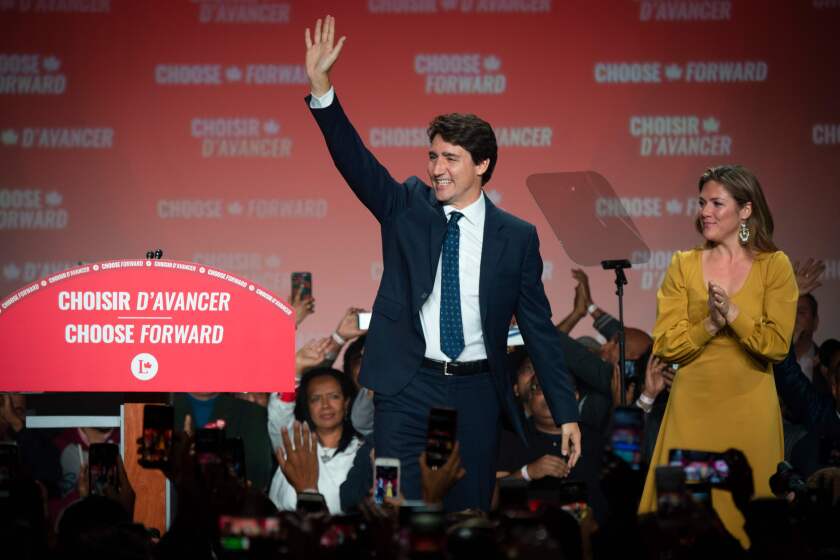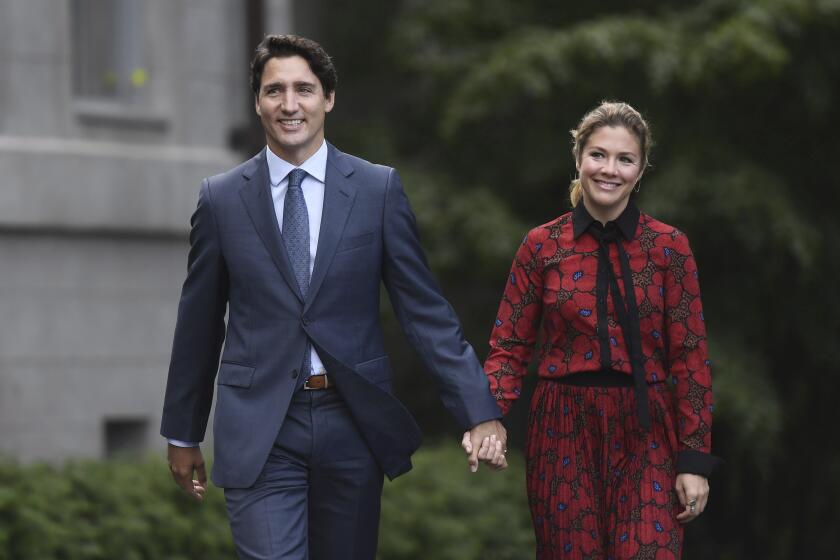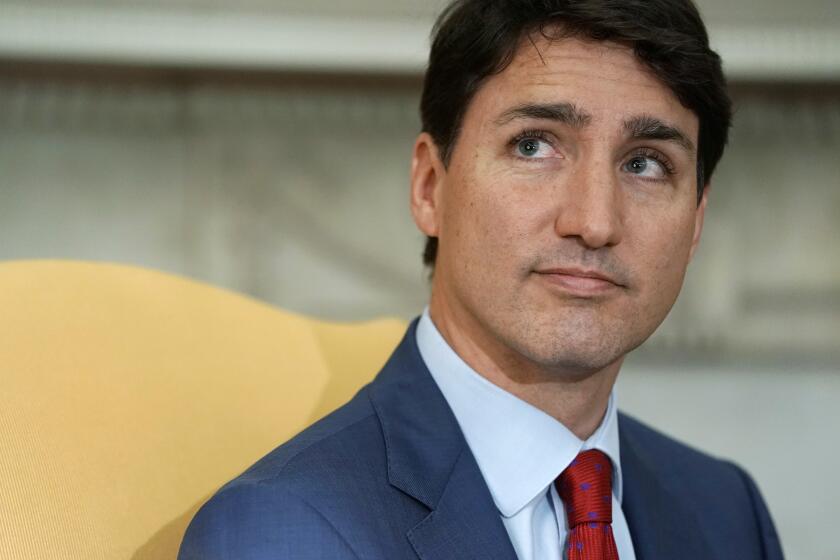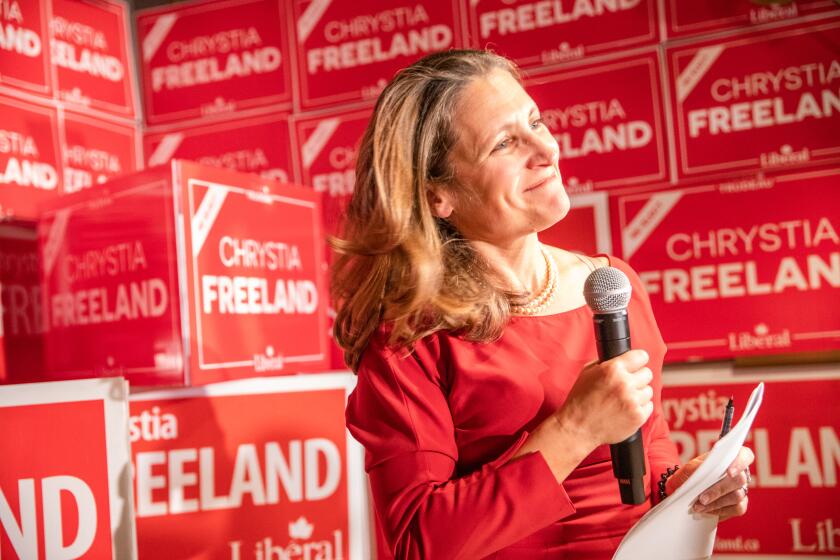Justin Trudeau takes a hit with Canada’s failure to win U.N. council seat

- Share via
TORONTO — Justin Trudeau arrived on the world stage with rock-star popularity in 2015. The young new Canadian prime minister declared, “Canada is back,” and made winning a seat on the powerful United Nations Security Council a top foreign-policy priority.
But Canada lost out to Norway and Ireland last week in a three-way race for two seats. It was Canada’s second consecutive defeat in a bid for a seat and an especially big blow to Trudeau.
“There is no doubt that this is not the result I was hoping for,” the prime minister said glumly a day after Wednesday’s vote, in which Canada came in last.
Trudeau blamed the loss on Canada’s late start in campaigning for the seats. Norway and Ireland had declared their candidacies for the seats well before Trudeau was elected in 2015, after which he announced Canada’s intention to run.
“The reality was, coming in five years later than them gave us a delay that we unfortunately weren’t able to overcome,” Trudeau said. He gave no other reasons why Canada lost.
The loss was especially embarrassing because of Canada’s stature as an economic powerhouse, part of the G7 and a member of NATO.
Canadian Prime Minister Justin Trudeau’s long silence came when a reporter asked him to comment on Trump’s threat to use the armed forces to quell violence.
Some U.N. diplomats say Canada ran a good campaign, maybe even the best campaign, but added that when it comes to voting at the United Nations, especially by a secret ballot, governments have many other considerations.
As part of North America, some experts say Canada suffers because of its geographic association with the United States, even though Trudeau and President Trump often don’t see eye-to-eye on issues such as free trade and climate change.
It also had supported Israel over the Palestinians in the General Assembly, a stance that did not go unnoticed by the Arab League and the larger 57-member Organization of Islamic Cooperation, although there was a sudden shift in November when Canada backed Palestinian rights to self-determination.
Canada also has had brushes with China and Japan.
It took her illness to jolt Canada into action. Schools closed. Gyms emptied out. Antibacterial wipes were hard to find. Grocery stores were mobbed.
Nelson Wiseman, a political science professor at the University of Toronto, said the failure to win a Security Council seat was “a big blow to Trudeau, although the result was not surprising.”
“Trudeau may be popular with women when he travels abroad, but that doesn’t cut it in U.N. politics,” Wiseman said. “Canada is back, as Trudeau says, but at the end of the line.”
Because of the Security Council’s mandate to ensure international peace and security, winning a seat is considered a pinnacle of achievement for many countries. It gives them a strong voice on crucial issues such as sanctions, as well as war and peace, involving conflicts in Syria, Yemen, Libya, Africa and Ukraine. It also addresses the nuclear threat posed by North Korea and Iran, and attacks by extremist groups.
Trudeau promoted Canada’s bid by noting that the multilateral system is challenged by large countries withdrawing their support for engagement on the world stage. He said the world needs medium-sized countries like Canada to step up and defend it.
“We will remain committed to multilateralism,” he said. “It also matters to many, many countries around the world that Canada continues to be present in defending multilateralism.”
Canadian Prime Minister Justin Trudeau’s campaigning for national elections has been hit by the publication of a yearbook photo showing him in brownface makeup at a costume party in 2001.
Robert Bothwell, a professor of Canadian history and international relations at the University of Toronto, said the loss was “a blow to Trudeau because he set it up to be one.”
Canada lost for a number of reasons, he said, including the fact that its neighbor is the United States and it has not had much success at “establishing linkages” with other countries. He also said European countries usually support others in Europe, and Arab countries tend to vote in terms of Israel.
It’s not known how Japan voted, but Bothwell said Trudeau likely angered Tokyo when he delayed signing the Trans-Pacific Partnership trade deal.
China-Canada relations also are at a low. Chinese prosecutors charged two detained Canadians with spying Friday in an apparent bid to pressure Canada to drop a U.S. extradition request for an executive of China’s technology giant Huawei who is under house arrest in Vancouver.
Bothwell also said that Chrystia Freeland, Canada’s deputy prime minister, took no interest in the U.N. during her tenure as foreign minister.
Chrystia Freeland has been called Canada’s ‘minister of everything,’ in charge of the country’s battle against the coronavirus and designated as Prime Minister Justin Trudeau’s successor if he falls ill.
Canada’s loss came in the first round of voting in the U.N. General Assembly, where 192 of the 193 U.N. member nations cast secret ballots for five new Security Council members.
Canada needed 128 votes — two-thirds of the voting members of the assembly. Norway passed the threshold with 130 votes and Ireland got 128 votes. Canada fell short with 108 votes.
Trudeau’s bid actually finished with fewer votes than that of Canada’s previous prime minister, Conservative Stephen Harper, in 2010. Trudeau’s Liberals, who were in opposition at the time, blamed Conservative foreign policy for the previous failure.
Norway and Ireland will start two-year terms on the council on Jan. 1, 2021, along with India and Mexico, who won uncontested seats, and Kenya, which defeated Djibouti in a second round of voting Thursday.
Breaking News
Get breaking news, investigations, analysis and more signature journalism from the Los Angeles Times in your inbox.
You may occasionally receive promotional content from the Los Angeles Times.
Respected columnist Paul Wells wrote a stinging rebuke of the current government in Maclean’s magazine.
“Believing it would fall from the heavens on Trudeau because he wasn’t Harper was an expression of the narcissism and shallowness that have characterized this government during much of its time in office,” Wells wrote.
More to Read
Sign up for Essential California
The most important California stories and recommendations in your inbox every morning.
You may occasionally receive promotional content from the Los Angeles Times.

















